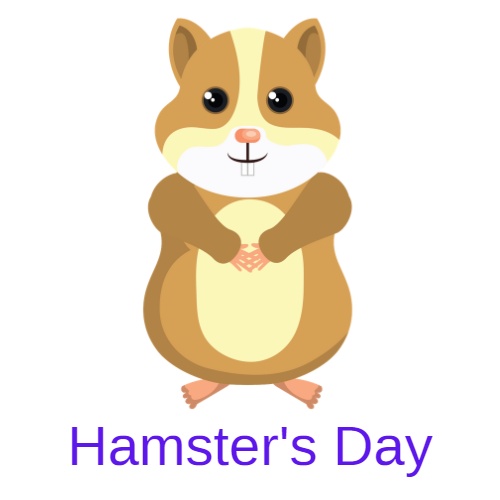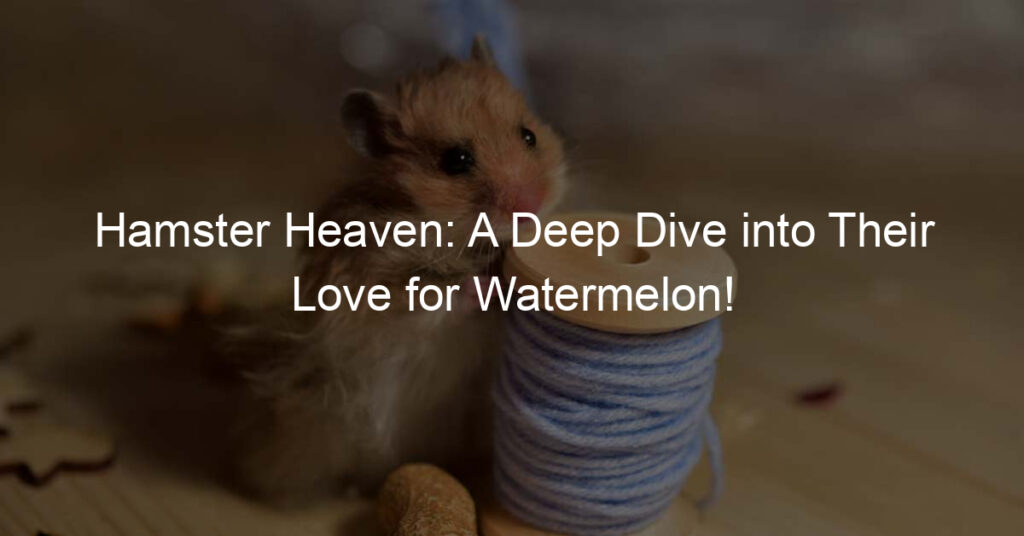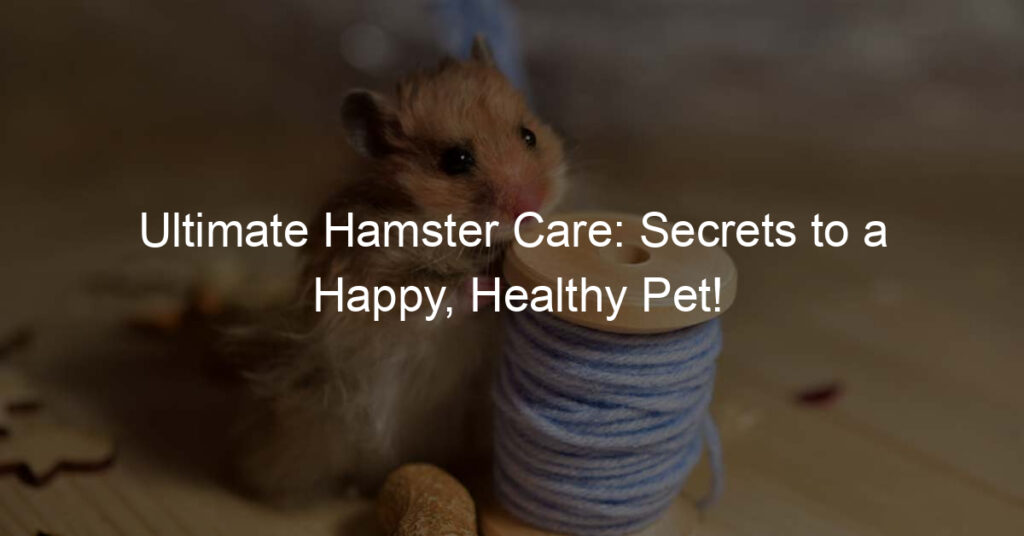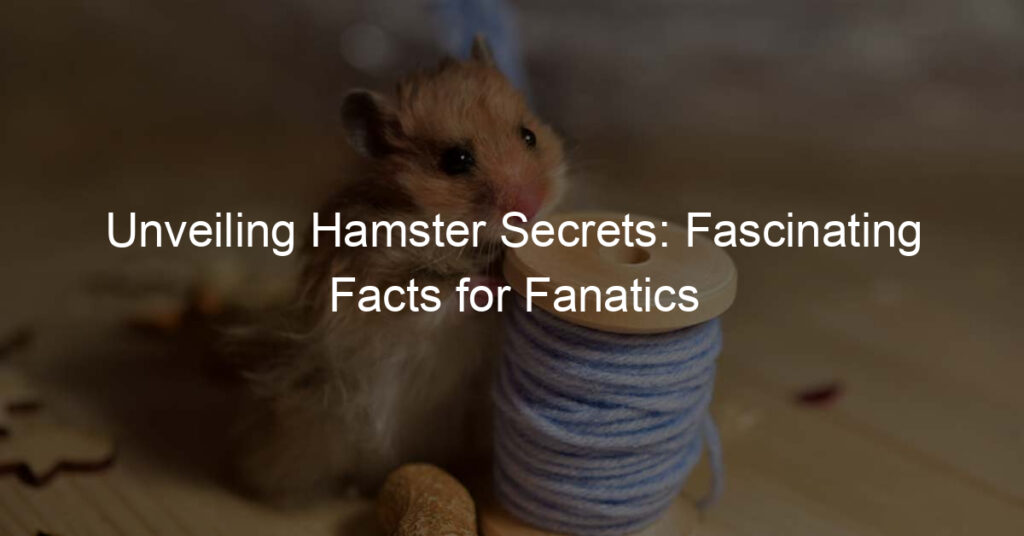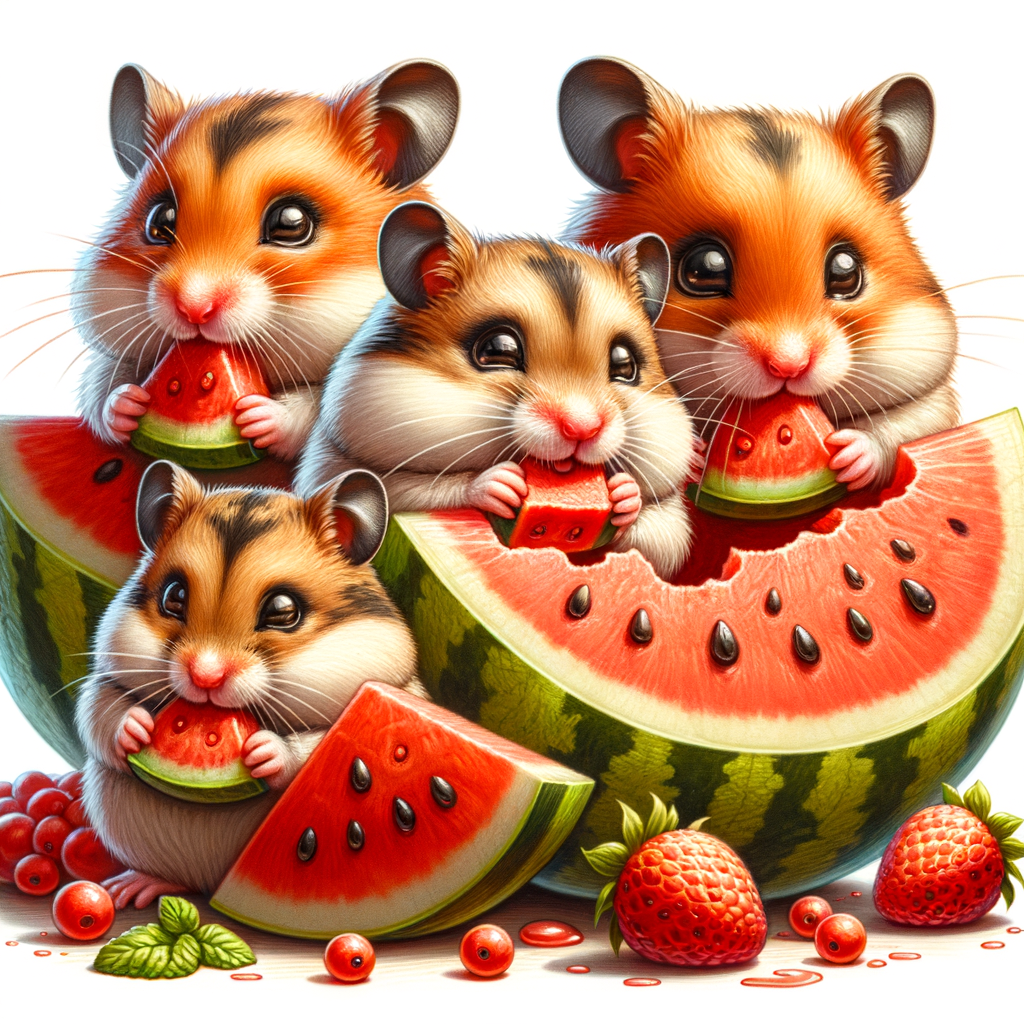
Introduction: Hamsters and Their Love for Fruits
Hamsters are adorable little creatures that have won the hearts of many pet lovers around the world. One of the many interesting aspects of these small mammals is their diet, which is surprisingly diverse and includes a variety of fruits. In this blog post, we will be exploring the diet of hamsters, the importance of fruits in a hamster’s diet, and some common fruits that hamsters enjoy.
- Exploring the diet of hamsters
- Importance of fruits in a hamster’s diet
- Common fruits hamsters enjoy
Hamsters are omnivores, which means they eat both plants and meat. Their diet in the wild consists of seeds, grass, insects, and even small animals. However, domesticated hamsters have a slightly different diet. They usually eat a mix of hamster pellets, fresh vegetables, and fruits. It’s important to note that not all fruits and vegetables are safe for hamsters, so it’s crucial to know what’s good for them and what’s not.
Fruits play a vital role in a hamster’s diet. They are packed with essential vitamins and minerals that help keep the hamster healthy. Fruits like apples, pears, and peaches are rich in Vitamin C, which is crucial for a hamster’s health. They also contain fiber, which aids in digestion. However, fruits should only make up a small portion of a hamster’s diet, as too much can lead to health issues like obesity and diabetes.
Hamsters enjoy a variety of fruits. Some of their favorites include apples (without seeds), bananas, blueberries, and strawberries. They also love watermelon, which is a great fruit for hydration, especially during the summer months. However, it’s important to remove any seeds from the fruits before giving them to your hamster, as they can be a choking hazard.
In the following sections, we will delve deeper into one particular fruit that hamsters seem to love – watermelon. We will discuss its nutritional benefits, how to safely feed it to your hamster, and potential concerns you should be aware of.
Hamsters Eating Watermelon: A Delightful Sight
There’s something truly heartwarming about watching a hamster enjoy a slice of watermelon. Their tiny paws holding the fruit, their little teeth nibbling away – it’s a sight that can melt even the coldest of hearts. But why do hamsters love watermelon so much? Let’s delve into this delightful phenomenon.
- Observations of Hamsters Munching on Melon
- Why Do Hamsters Love Watermelon?
Hamsters are known for their love of fruits, and watermelon is no exception. Observing a hamster eating watermelon is a fascinating experience. They approach the fruit with curiosity, sniffing it before taking their first bite. Their eyes light up as they taste the sweet, juicy flesh of the watermelon. They nibble at it enthusiastically, their tiny cheeks bulging as they store some for later. It’s a sight that’s as adorable as it is amusing.
Hamsters love watermelon for several reasons. Firstly, watermelon is juicy and sweet, which appeals to their taste buds. Secondly, it’s easy for them to eat. The soft texture of watermelon makes it easy for their small teeth to bite into. Lastly, watermelon is a great source of hydration. Hamsters, being desert animals, appreciate this moisture-rich fruit.
It’s important to note that while hamsters love watermelon, it should be given in moderation. Too much can lead to health problems like diarrhea due to its high water content. Always ensure that your hamster’s diet is balanced and nutritious.
Watching hamsters eat watermelon is not just a delightful sight, but it also offers insights into their dietary preferences and habits. So next time you see your furry friend munching on a slice of watermelon, take a moment to appreciate this simple joy.
Watermelon in Hamster Diet: A Nutritional Breakdown
Watermelon is a delicious and nutritious fruit that many of us enjoy, especially during the hot summer months. But did you know that it can also be a beneficial addition to your hamster’s diet? Let’s take a closer look at the nutritional content of watermelon and how it can benefit your furry friend.
- Nutritional content of watermelon
Watermelon is packed with nutrients that are beneficial for hamsters. It is high in vitamins A and C, which are essential for maintaining a healthy immune system. Additionally, watermelon is a great source of hydration as it contains about 92% water. It also has small amounts of fiber, which aids in digestion.
| Nutrient | Amount per 100g of Watermelon |
|---|---|
| Vitamin A | 569 IU |
| Vitamin C | 8.1 mg |
| Water | 92 g |
| Fiber | 0.4 g |
- Benefits of watermelon for hamsters
Feeding your hamster watermelon can provide several health benefits. The high water content helps keep your hamster hydrated, especially during hot weather. The vitamins A and C support a healthy immune system, helping your hamster fight off illnesses. The fiber in watermelon can also aid in digestion and prevent constipation.
- How much watermelon should a hamster eat?
While watermelon is beneficial for hamsters, it should only be given in moderation. Too much watermelon can lead to diarrhea due to its high water content. A small piece of watermelon, about the size of your hamster’s paw, is a good serving size. Remember to remove any uneaten watermelon after a few hours to prevent it from spoiling.
It’s also important to note that watermelon should not replace a balanced hamster diet. It should only be given as a treat, in addition to a diet of hamster pellets, grains, and other fruits and vegetables.
Feeding Watermelon to Hamsters: A Guide
Feeding your hamster can be a delightful experience, especially when you introduce new fruits like watermelon into their diet. However, it’s essential to prepare the watermelon correctly to ensure it’s safe and enjoyable for your little friend.
Preparation of Watermelon for Hamsters
Here are some steps to follow when preparing watermelon for your hamster:
- Choosing the right watermelon:
- Preparing the watermelon for your hamster:
Not all watermelons are created equal. When choosing a watermelon for your hamster, look for one that is ripe and fresh. A ripe watermelon has a uniform color and a slightly hollow sound when you tap it. Avoid watermelons with bruises or cuts, as they may contain harmful bacteria.
Once you have chosen the right watermelon, it’s time to prepare it. Start by washing the outer surface of the watermelon to remove any dirt or bacteria. Then, cut a small piece of watermelon, remove the seeds and the rind as they can be a choking hazard for your hamster. Cut the watermelon into small, bite-sized pieces that your hamster can easily handle and chew.
Remember, while watermelon can be a tasty treat for your hamster, it should not replace their regular diet. Always provide a balanced diet to your hamster for optimal health.
Introducing Watermelon into Your Hamster’s Diet
Introducing a new food into your hamster’s diet, like watermelon, should be done gradually and with care. Here are some steps to follow and signs to look out for to ensure your hamster enjoys this juicy treat.
- How to Gradually Introduce Watermelon
- Signs Your Hamster Enjoys Watermelon
- Your hamster eagerly eats the watermelon when offered.
- After eating watermelon, your hamster appears content and shows no signs of discomfort.
- Your hamster may even stash some watermelon in its cheek pouches for later, which is a sure sign it likes this treat.
Start by offering a small piece of watermelon to your hamster. The size should be no larger than a pea. This allows your hamster to get used to the taste and texture of the watermelon without overwhelming its system. Monitor your hamster’s reaction to the watermelon. If it seems to enjoy the treat and shows no signs of discomfort, you can gradually increase the amount of watermelon over time. Remember, moderation is key. Too much of any fruit, including watermelon, can lead to health issues in hamsters.
Hamsters have different tastes, just like humans. Some may love watermelon, while others may not. How can you tell if your hamster enjoys watermelon? Look for these signs:
Remember, every hamster is unique. What works for one may not work for another. Always monitor your hamster’s behavior and adjust its diet accordingly. The goal is to keep your furry friend happy, healthy, and satisfied.
Safe Fruits for Hamsters: Beyond Watermelon
While watermelon is a delightful treat that hamsters enjoy, it’s not the only fruit that can be safely incorporated into their diet. There’s a wide variety of fruits that your furry friend can enjoy, each with its unique nutritional benefits.
- Other Fruits Safe for Hamsters
Aside from watermelon, there are many other fruits that are safe for hamsters. These include:
- Apples (without seeds)
- Pears
- Peaches
- Strawberries
- Bananas
Each of these fruits offers different nutritional benefits. For instance, apples are a great source of fiber and vitamin C, while bananas can provide your hamster with much-needed potassium. However, remember to remove any seeds or pits from these fruits, as they can be harmful to your hamster.
- How to Introduce New Fruits into Your Hamster’s Diet
Introducing new fruits into your hamster’s diet should be done gradually. Here’s a simple guide to help you:
- Start Small: Begin by offering small pieces of the new fruit. This allows your hamster to get used to the taste and texture without overwhelming their system.
- Monitor Their Reaction: Watch your hamster’s reaction to the new fruit. If they seem to enjoy it and don’t show any signs of discomfort or illness, you can continue to include it in their diet.
- Gradually Increase the Amount: If your hamster enjoys the new fruit and doesn’t show any adverse reactions, you can gradually increase the amount you offer. However, remember that fruits should only make up a small portion of your hamster’s diet.
Remember, every hamster is unique and may have different preferences and tolerances. Always monitor your hamster’s reaction when introducing any new food into their diet.
Watermelon and Hamster Health: Potential Concerns
As much as hamsters enjoy the refreshing taste of watermelon, there are certain potential concerns that pet owners should be aware of. Let’s delve into these issues and understand how we can ensure the health and happiness of our little furry friends.
- Potential risks of feeding watermelon to hamsters
- What to do if your hamster reacts negatively to watermelon
While watermelon is generally safe for hamsters, it’s important to remember that it contains a high amount of sugar and water. Feeding your hamster too much watermelon can lead to diarrhea or obesity. This is because the digestive system of hamsters is not designed to handle large amounts of sugar and water.
Another potential risk is the watermelon seeds. These can pose a choking hazard for your hamster. Therefore, it’s crucial to remove all seeds before feeding watermelon to your hamster.
If your hamster shows signs of discomfort after eating watermelon, such as diarrhea, lethargy, or loss of appetite, it’s best to stop feeding them watermelon immediately. In such cases, it’s advisable to consult with a vet to ensure your hamster’s health isn’t at risk.
Remember, every hamster is unique and might react differently to certain foods. What works for one might not work for another. Therefore, it’s always a good idea to introduce new foods gradually and monitor your hamster’s reaction.
In conclusion, while watermelon can be a tasty treat for your hamster, it’s essential to feed it in moderation and observe your pet for any adverse reactions. Your hamster’s health should always be your top priority.
Conclusion: The Joy of Hamsters Eating Watermelon
As we conclude our journey into the delightful world of hamsters enjoying watermelon, let’s take a moment to reflect on the key insights we’ve gathered. The sight of a hamster nibbling on a juicy piece of watermelon can indeed be a joy to behold, but it’s more than just an adorable spectacle. It’s a testament to the benefits of a well-rounded diet for these small creatures.
- Recap of the benefits of watermelon for hamsters
- Final thoughts on hamsters and fruit
Watermelon, as we’ve discovered, is a nutritious treat for hamsters. It’s packed with vitamins A and C, which are essential for a hamster’s overall health. These vitamins support their immune system, skin health, and vision. The high water content in watermelon also aids in hydration, especially during hot summer months.
While watermelon is a safe and beneficial fruit for hamsters, it’s important to remember that it should only be a small part of their diet. Too much of any fruit can lead to health issues like obesity and diabetes. Always introduce new fruits slowly and in moderation to monitor your hamster’s reaction. And remember, variety is key. Other safe fruits for hamsters include apples, pears, and bananas.
In the end, the joy of hamsters eating watermelon is not just about the cute factor. It’s about providing a healthy, varied diet for our furry friends. So, the next time you see your hamster enjoying a piece of watermelon, know that you’re not just giving them a treat. You’re contributing to their well-being.
